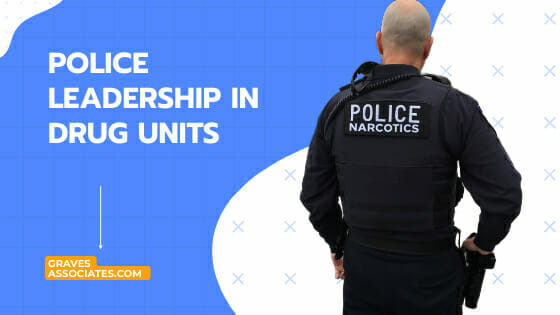Challenges of Police Leadership in Drug Units
Leadership and supervision are integral to the success of any organization, and this is particularly true in the field of law enforcement. Leadership refers to the ability to inspire and guide others towards a shared goal, while supervision involves overseeing and managing the work of a team. In police drug units, effective police leadership and supervision are crucial for ensuring the safety of officers and the community, as well as the effectiveness of drug enforcement operations. In this article, we will explore the definition and importance of leadership and supervision in police drug units, and how they contribute to the success of these units in combating drug crime.

Roles and responsibilities of leaders and supervisors in police drug units
Leaders and supervisors in police drug units have a variety of roles and responsibilities that are crucial to the success of the unit. Some of the main duties of leaders and supervisors in these units include:
Setting goals and objectives for the unit: Leaders and supervisors are responsible for setting clear, achievable goals for the unit and developing strategies for achieving them. This may include setting targets for arrests, seizures, and other measures of success.
Providing direction and guidance to team members: Leaders and supervisors are responsible for providing direction and guidance to team members, helping them to understand their roles and responsibilities and how they fit into the overall goals of the unit. They may also mentor and support team members in their professional development.
Monitoring and evaluating team performance: Leaders and supervisors are responsible for monitoring the performance of team members and evaluating their progress towards achieving unit goals. This may include setting performance targets, conducting performance evaluations, and providing feedback to team members.
Promoting professional development and training: Leaders and supervisors play a key role in promoting professional development and training within the unit. They may encourage team members to pursue additional education and training, and may also organize and oversee in-house training programs to keep team members up-to-date on the latest techniques and technologies in drug enforcement.
Maintaining accountability and integrity within the unit: Leaders and supervisors are responsible for maintaining high levels of accountability and integrity within the unit. This may involve enforcing strict codes of conduct, monitoring team members to ensure they are following protocols, and taking disciplinary action when necessary.
The roles and responsibilities of leaders and supervisors in police drug units are crucial to the success of the unit in combating drug crime. By setting clear goals, providing direction and guidance, monitoring and evaluating team performance, promoting professional development and training, and maintaining accountability and integrity, leaders and supervisors play a vital role in ensuring that the unit is able to effectively carry out its mission.
Best practices for effective police leadership and supervision in drug units
There are a number of best practices that leaders and supervisors in police drug units can follow to ensure that they are effective in their roles. Some of the key practices for effective leadership and supervision include:
Setting clear expectations and communication channels: Leaders and supervisors should be clear about their expectations for team members, including their roles and responsibilities, performance targets, and expected behaviors. They should also establish clear communication channels, including regular team meetings and one-on-one check-ins, to ensure that team members feel comfortable sharing their thoughts, ideas, and concerns.
Encouraging teamwork and collaboration: Leaders and supervisors should foster a team-oriented approach and encourage teamwork and collaboration among team members. This may include promoting open communication, encouraging team members to share their expertise and knowledge, and supporting team-building activities.
Providing support and resources to team members: Leaders and supervisors should provide support and resources to team members to help them perform their roles effectively. This may include providing training and professional development opportunities, as well as access to necessary tools, equipment, and other resources.
Fostering a positive and respectful work environment: Leaders and supervisors should create a positive and respectful work environment where team members feel valued and supported. This may include promoting diversity and inclusion, addressing conflicts in a constructive manner, and recognizing and rewarding team members for their contributions.
Managing conflict and challenges within the team: Leaders and supervisors should be prepared to manage conflict and challenges within the team, whether they are related to team dynamics or external factors. This may involve mediating disputes, providing support to team members who are struggling, and finding creative solutions to problems.
By following these best practices, leaders and supervisors in police drug units can ensure that they are effective in their roles and that their teams are able to work effectively together to achieve their goals.
Skills and qualities of effective leaders and supervisors in police drug units
There are a number of skills and qualities that are essential for effective leadership and supervision in police drug units. Some of the key skills and qualities include:
Leadership skills such as communication, decision-making, and conflict resolution: Leaders and supervisors should possess strong leadership skills, including effective communication, the ability to make sound decisions, and the ability to resolve conflicts in a constructive manner. These skills are essential for inspiring and guiding team members towards shared goals, as well as managing the challenges and conflicts that may arise in the course of drug enforcement work.
Knowledge of drug laws, policies, and procedures: Leaders and supervisors should have a thorough understanding of drug laws, policies, and procedures, including relevant federal, state, and local laws and regulations. This knowledge is essential for ensuring that the unit operates in compliance with the law and for guiding team members in their work.
Ability to build and maintain relationships with other law enforcement agencies, community partners, and stakeholders: Leaders and supervisors should have the ability to build and maintain relationships with other law enforcement agencies, community partners, and stakeholders. This may involve collaborating with other agencies on drug enforcement efforts, engaging with the community to build trust and support, and working with stakeholders to address the underlying causes of drug crime.
Effective leaders and supervisors in police drug units should possess a range of skills and qualities that enable them to inspire and guide their teams, ensure compliance with the law, and build and maintain relationships with key partners and stakeholders. By cultivating these skills and qualities, leaders and supervisors can help their units to be more effective in their mission to combat drug crime.
Challenges and strategies for overcoming leadership and supervision challenges in police drug units
Leadership and supervision in police drug units can present a range of challenges, including:
Managing workload and resource constraints: Leaders and supervisors may face challenges in managing workload and resource constraints, including limited staffing and budget. To overcome these challenges, leaders and supervisors may need to be creative in finding ways to make the most of available resources and may need to prioritize tasks and delegate responsibilities effectively.
Dealing with high-stress and potentially dangerous situations: Drug enforcement work can be high-stress and may involve working in potentially dangerous situations. Leaders and supervisors should be prepared to support team members in managing stress and maintaining mental and physical well-being, and should have strategies in place for responding to emergencies and other crisis situations.
Maintaining team morale and motivation: Maintaining team morale and motivation can be a challenge, particularly in the face of long hours, high stress, and the potential for dangerous situations. Leaders and supervisors should be proactive in finding ways to support team members and keep morale high, such as recognizing and rewarding their contributions, promoting a positive and respectful work culture, and providing opportunities for team-building and professional development.
Ensuring proper training and development for team members: Ensuring that team members have the knowledge and skills they need to perform their roles effectively is an ongoing challenge for leaders and supervisors. They should be proactive in identifying training and development needs and in providing opportunities for team members to acquire the skills they need to be successful. This may include in-house training programs, professional development courses, and opportunities for hands-on learning and experiential education.
Responding to changes in the drug landscape and law enforcement strategies: Leaders and supervisors should be prepared to respond to changes in the drug landscape and shifts in law enforcement strategies. This may involve adapting to new technologies, methods of operation, and trends in drug trafficking, as well as staying up-to-date on changes in laws and regulations. To overcome these challenges, leaders and supervisors may need to be proactive in seeking out information and training, and in developing contingency plans for responding to unexpected developments.
Police leadership and supervision in drug units can present a range of challenges, but by being proactive and creative in finding solutions, leaders and supervisors can help their teams to overcome these challenges and be more effective in their mission to combat drug crime.
Wrapping it All Up
Leadership and supervision are crucial to the success of police drug units in combating drug crime. Effective leaders and supervisors inspire and guide their teams, provide direction and guidance, monitor and evaluate performance, and promote professional development and training. They also play a key role in maintaining accountability and integrity within the unit and in building and maintaining relationships with other law enforcement agencies, community partners, and stakeholders.
However, leadership and supervision in police drug units can present a range of challenges, including managing workload and resource constraints, dealing with high-stress and potentially dangerous situations, maintaining team morale and motivation, and responding to changes in the drug landscape and law enforcement strategies. To overcome these challenges, leaders and supervisors need to be proactive and creative in finding solutions, and they should be committed to ongoing training and development to ensure that they are well-equipped to lead and manage their teams effectively.
The importance of leadership and supervision in police drug units cannot be overstated, and ongoing training and development for leaders and supervisors is crucial for ensuring the success and effectiveness of these units in combating drug crime.



